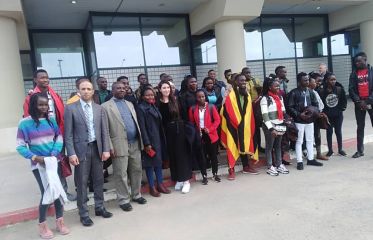Breaking News
- Ministry of Education and Sports Azerbaijan Government Scholarships For 2025-2026 Academic Year ...Read More
- Government Sponsorship Undergraduate Admission Lists 2025-26 for Makerere University ...Read More
- Ministry of Education And Sports: Egyptian Government Scholarships 2025-2026 Academic Year ...Read More
- Ground Breaker Full Scholarship for girls to study Software Engineering 2025 July Intake ...Read More
- Tony Elumelu Foundation Entrepreneurship Programme (TEEP) 2025 for young African Entrepreneurs ...Read More
- DESIGNING FUTURES 2050 International Design Competition 2025 (€15,000 prize) ...Read More
- Ground Breaker Full time Scholarship for girls to study Software Engineering 2025 Intake ...Read More
- Ministry of Education And Sports Algerian Vocational Training Scholarships for 2024-2025 AY ...Read More
- Ministry of Education and Sports Advert for the Algerian Government Scholarships for 2024-2025 ...Read More
- Uganda Dev Summit 2024 Live Stream ...Read More
Virtual Factory Network Relief Fund for Artisans (Win Up to 10 Million UGX)
Deadline 16th October 2022
Background
The disruption by the COVID-19 pandemic amplified many of the challenges already facing youth employment in Sub-Saharan Africa.
The immediate impact on informal employment in Uganda has been particularly acute for younger demographics, including those employed through the cottage industries given their prevalence.
The heightened challenges for youth unemployment, a visible gap in skills needed to run individual businesses, and an economy that has been largely dependent on the formal professions and careers has paved way for The Cottage Catapult program to provide a roadmap for the cottage industry ecosystem and support in the skilling, market access and the creation of more jobs for the future.
About the Cottage Industry Catapullt Program
The Cottage Industry Catapult program is a partnership program between The Aghakhan Foundation and The Innovation village funded by the European Union which will run for 4 months aiming to invest in value chains that creatives, artisans, and Cottage Industry entrepreneurs need to refine and scale their businesses and specifically targets young people especially young women who are self-employed from both formal and informal cottage industry sectors.
The program leverages a network of digital platforms and hands-on training to provide the community of cottage industry entrepreneurs (CIs) with access to raw material suppliers, financial institutions, training, and market.
Leveraging the CFYE scoping report which states that one of the major obstacles facing young people is unemployment, which has resulted in overall demand for labour and other macro-economic pressures. The program focuses on solving these challenges with the 3 core challenges namely:
- Poor quality and inconsistent raw materials
- No access to credit to stabilize supply chains
- Limited access to market and constrained revenues
The program will also focus on an apprenticeship program through which our intervention will equip entrepreneurs to create long-term sustainable and scalable ventures in the cottage industries mainly focusing on accessibility to relevant skills in tailoring and carpentry.
Target Sectors
1. Textiles
2. Handicrafts
3. Artisans
4. Wood and Metal
5. Food Processing
Who Qualifies
- I am an 18 – 35-year-old woman or Man
- I am a young self-employed entrepreneur
- I work in the formal or informal cottage sector
- I am interested in business skills development
- Business is registered
- The business has trading license
- Business is tax compliant
- I have challenges in accessing materials and machinery for my business
- I want to join an agent network to ease my access to markets
- I have entry level knowledge on Tailoring/ Carpentry
- I can dedicate 3 months to the initiative
Program Interventions
Selected enterprises will be awarded up-to UGX 10 million to support with
1. Access to Market
2. Raw Materials
3. Machinery
4. Access to Finance
5. Apprenticeship
6. Agent Network
Participant Benefits
1. Reliable & affordable access to raw materials and machinery
2. Easier access to wider markets
3. Access to finance for materials and machinery purchase
4. Opportunities for higher performing entrepreneurs to scale businesses
5. Agent network to facilitate access to digital platforms for offline entrepreneurs
6. Apprenticeship Program through mentorship opportunities
Source * https://vfnafrica.com/relieffund/
Apply Here >>>
Top Courses Currently Admitting
-
Diploma in Procurement and Logistics
Web Info-net institute of Technology
-
National Diploma In Information and Communication Technology
Datamine Technical Business School
-
Diploma in Guidance and Counseling with Education
Ndejje University
-
Bachelor of Development Ministry
Bugema University
-
Bachelor of Social & Entrepreneural Forestry
Makerere University


























